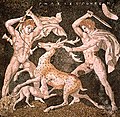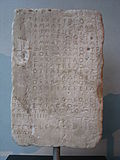Koine Greek (UK: /ˈkɔɪni/ KOY-nee; US: /ˈkɔɪneɪ/ KOY-nay, /kɔɪˈneɪ/ koy-NAY; Koine Greek: ἡ κοινὴ διάλεκτος, romanized: hē koinè diálektos, lit. 'the common... 43 KB (4,862 words) - 21:55, 27 April 2024 |
changes during the Koine Greek period concerned vowels: these were the loss of vowel length distinction, the shift of the Ancient Greek system of pitch accent... 78 KB (8,451 words) - 17:37, 5 March 2024 |
Koine Greek grammar is a subclass of Ancient Greek grammar peculiar to the Koine Greek dialect. It includes many forms of Hellenistic era Greek, and authors... 9 KB (1,109 words) - 06:14, 20 February 2023 |
Jewish Koine Greek, or Jewish Hellenistic Greek, is the variety of Koine Greek or "common Attic" found in a number of Alexandrian dialect texts of Hellenistic... 10 KB (1,469 words) - 16:38, 27 November 2023 |
up Koine or Koiné in Wiktionary, the free dictionary. The literal meaning of the Greek word κοινή (koinḗ) is "common". It may refer to: Koine Greek, the... 482 bytes (92 words) - 21:32, 17 March 2024 |
(Δημοτική), refers to all popular varieties of Modern Greek that followed a common evolutionary path from Koine and have retained a high degree of mutual intelligibility... 31 KB (3,234 words) - 19:01, 10 April 2024 |
levelling to form Koine Greek which was used as a lingua franca throughout the eastern Roman Empire, and later grew into Medieval Greek. For much of the... 10 KB (1,197 words) - 01:55, 22 February 2024 |
 | In linguistics, a koine or koiné language or dialect (pronounced /ˈkɔɪneɪ/; from Ancient Greek κοινή 'common') is a standard or common dialect that has... 14 KB (1,538 words) - 13:18, 25 April 2024 |
Biblical languages (category Greek language) were written in Greek for Greek-speaking audiences. See Greek primacy for further details. Koine Greek was the popular form of Greek which emerged in... 7 KB (1,233 words) - 00:15, 2 February 2024 |
Iota (redirect from Iota (Greek)) both long [iː] and short [i] versions, but this distinction was lost in Koine Greek. Iota participated as the second element in falling diphthongs, with... 6 KB (473 words) - 07:10, 19 March 2024 |
Language of the New Testament (redirect from Greek primacy) Bible itself. Whereas the Classical Greek city states used different dialects of Greek, a common standard, called Koine (κοινή "common"), developed gradually... 14 KB (1,775 words) - 06:37, 5 April 2024 |
Koine Greek, the variety of Greek used after the conquests of Alexander the Great in the fourth century BC, is sometimes included in Ancient Greek, but... 132 KB (13,716 words) - 19:23, 28 March 2024 |
 | Septuagint (redirect from Greek Old Testament) books of the Hebrew Bible were translated from Biblical Hebrew into Koine Greek by Jews living in the Ptolemaic Kingdom, probably in the early or middle... 77 KB (7,698 words) - 00:28, 20 April 2024 |
Synaeresis Greek language Koine Greek phonology Modern Greek grammar Greek alphabet Greek language question Greek ligatures Greek braille Greek minuscule... 34 KB (2,737 words) - 16:47, 20 April 2024 |
and structure. Medieval Greek is the link between this vernacular, known as Koine Greek, and Modern Greek. Though Byzantine Greek literature was still strongly... 57 KB (6,383 words) - 04:26, 28 April 2024 |
Hellenistic Judaism (category Articles containing Greek-language text) became the Koine-speaking core of Early Christianity centered on Antioch and its traditions, such as the Melkite Greek Catholic Church and the Greek Orthodox... 38 KB (4,578 words) - 12:35, 28 April 2024 |
Ancient Macedonian language (redirect from Ancient Macedonian Greek) Koine Greek. While the bulk of surviving public and private inscriptions found in ancient Macedonia were written in Attic Greek (and later in Koine Greek)... 85 KB (6,345 words) - 01:36, 7 April 2024 |
Chi (letter) (redirect from Chi (Greek letter)) Greek alphabet: /ks/). In Koine Greek and later dialects it became a fricative ([x]/[ç]) along with Θ and Φ. In Modern Greek, it has two distinct pronunciations:... 7 KB (698 words) - 09:40, 26 March 2024 |
Deuterocanonical books (category Articles containing Ancient Greek (to 1453)-language text) of Old Testament references in the New Testament are taken from the Koine Greek Septuagint (LXX), editions of which include the deuterocanonical books... 87 KB (10,429 words) - 06:01, 28 April 2024 |
 | Amethyst (section Ancient Greece) name comes from the Koine Greek αμέθυστος amethystos from α- a-, "not" and μεθύσκω (Ancient Greek) methysko / μεθώ metho (Modern Greek), "intoxicate", a... 30 KB (2,907 words) - 15:50, 28 April 2024 |
Book of Sirach (category Articles containing Ancient Greek (to 1453)-language text) the Second Temple period. Ben Sira's grandson translated the text into Koine Greek and added a prologue sometime around 117 BCE. Although the Book of Sirach... 44 KB (5,420 words) - 02:03, 4 April 2024 |
 | Phi (redirect from Phi (Greek)) romanization as ⟨ph⟩. During the later part of Classical Antiquity, in Koine Greek (c. 4th century BC to 4th century AD), its pronunciation shifted to that... 15 KB (1,480 words) - 05:41, 27 March 2024 |
 | Ancient Macedonians (redirect from Ancient Greek Macedonians) Classical era was Attic Greek, replaced by Koine Greek during the Hellenistic era. Their religious beliefs mirrored those of other Greeks, following the main... 188 KB (20,333 words) - 17:45, 31 March 2024 |
Mycenaean Greek, most ancient attested form of the language (16th to 11th centuries BC) Ancient Greek, forms of the language used c. 1000–330 BC Koine Greek, common... 3 KB (435 words) - 16:49, 17 April 2024 |
Demotic Greek. The linguistic lineage of Pontic Greek stems from Ionic Greek via Koine and Byzantine Greek, and contains influences from Russian, Turkish... 39 KB (3,136 words) - 06:13, 6 April 2024 |



